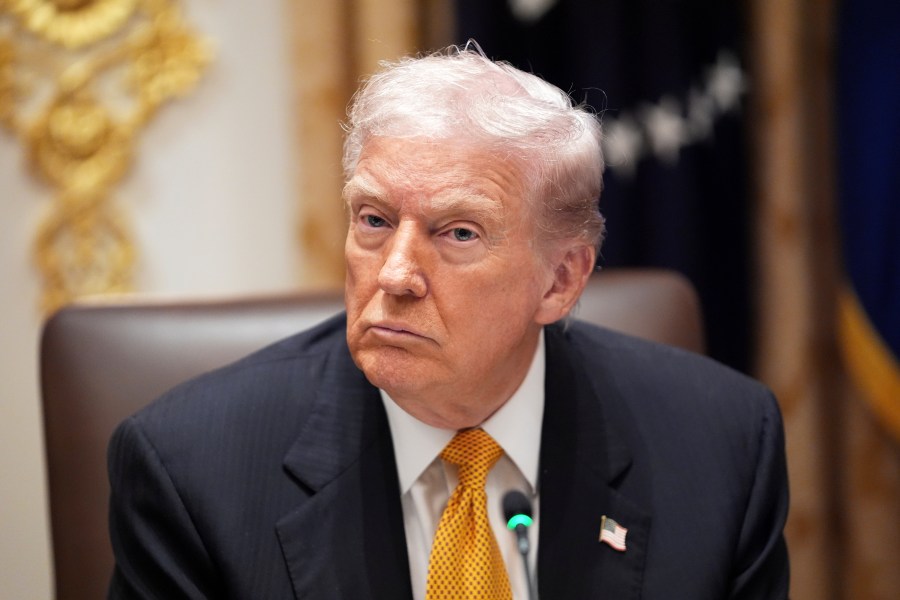
Senate leader eyes potential shutdown deal but there’s no guarantee of success
WASHINGTON (AP) — As the Senate held a rare Sunday session, the Republican leader said a potential deal was “coming together” on the government shutdown. But there was no guarantee it would end an impasse now stretching to 40 days.
Moderate Democrats huddled over the weekend to find a compromise to reopen the government as the shutdown continued to disrupt flights nationwide, threaten food assistance for millions of Americans and leave federal workers without pay.
Top Republicans were working with those Democrats to finalize a legislative package that would reopen the government into January while also approving full-year funding for several parts of government. The bill would also potentially reverse some recent mass layoffs of federal workers.
But the full details were still unclear, and the necessary Democratic support was far from certain as it appeared unlikely the package would extend health care subsidies that expire at the end of the year.
“A deal is coming together,” Senate Majority Leader John Thune, R-S.D., said as he walked in to open the Senate chamber. He warned, however, that it was not a done deal. Senators wanted time to read over the proposals, and action could be hours away.
“We’ll see where the votes are,” Thune said.
Democrats have now voted 14 times not to reopen the government as they demand the extension of subsidies for health plans offered under the Affordable Care Act. Republicans have rejected that offer, but they signaled openness to the emerging proposal from moderate Democrats to end the shutdown in exchange for a later vote on the “Obamacare” subsidies that make coverage more affordable.
For those enrolled in health exchanges under that law, premiums on average are expected to more than double next year if Congress allows the enhanced subsidies to lapse.
Democratic pushback expected
Republicans only need five votes from Democrats to reopen the government, so a handful of moderate senators could end the shutdown with only a promise of a later vote on health care. Around 10 to 12 Democrats have been involved in the talks.
If the Senate votes to reopen without a promise from Republicans to extend the subsidies, many Democrats are certain to push back.
Vermont Sen. Bernie Sanders, an independent who caucuses with Democrats, has encouraged his colleagues to keep fighting, saying that last week’s elections that were overwhelmingly favorable for Democrats “showed growing opposition to Trumpism and his efforts to decimate the already-broken American health care system.”
New York Rep. Ritchie Torres posted that the potential deal from moderate Democrats is “not a deal. It’s an unconditional surrender that abandons the 24 million Americans whose health care premiums are about to double.”
Senate Democratic leader Chuck Schumer, D-N.Y., made a public offer to Republicans on Friday to reopen the government and extend expiring health care subsidies for a year. But Republicans immediately rejected it, with Thune calling it a “nonstarter.”
The contours of a deal
New Hampshire Sen. Jeanne Shaheen, who is leading the negotiations among the Democratic moderates, said the Republican rejection of Schumer’s offer showed that “we need another path forward.”
The deal that Shaheen and others are crafting with Republicans would fund parts of government — food aid, veterans programs and the legislative branch, among other things — and extend funding for everything else until the end of January. The agreement would also take up Republicans on their longstanding offer to hold a future vote on the health care subsidies.
Negotiators have also been discussing language to reverse some of the Trump administration’s mass firings of federal workers that have happened since the shutdown began on Oct. 1. But that could potentially run into trouble with the White House and House Republicans.
Republicans released final legislative text of three full-year spending bills Sunday as they continued to work on a deal. The legislation keeps a ban on pay raises for lawmakers but boosts their security by $203.5 million in response to increased threats. There’s also a provision championed by Sen. Mitch McConnell, R-Ky., to prevent the sale of some hemp-based products.
But in a sign of potential political trouble ahead, the top Democrat on the House Appropriations Committee criticized the senators for moving ahead with aspects of the package before there was sign-off from all corners in Congress.
“Congress must invest in veterans, address the health care crisis that is raising costs on more than 20 million Americans, and prevent President Trump from not spending appropriated dollars in our communities,” said Rep. Rosa DeLauro, D-Conn.
Republicans preview health care debate
There is no guarantee that the Affordable Care Act subsidies would be extended if Republicans agree to a future vote on health care. House Speaker Mike Johnson, R-La., has said he will not commit to a health vote.
Some Republicans have said they are open to extending the COVID-19-era tax credits as premiums could skyrocket for millions of people, but they also want new limits on who can receive the subsidies. They also argue that the tax dollars for the plans should be routed through individuals.
Other Republicans, including Trump, have used the debate to renew their yearslong criticism of the law and called for it to be scrapped or overhauled.
“THE WORST HEALTHCARE FOR THE HIGHEST PRICE,” Trump said of the Affordable Care Act in a post Sunday.
Appearing uninterested in compromise, Trump has instead pushed Republican leaders to scrap the Senate’s filibuster rules that prevent the chamber from advancing on most legislation unless there is support from 60 senators. But Republican leaders have rejected his entreaties.
“Be the Smart Party,” Trump said in a social media post on Sunday.
Shutdown effects worsen
Meanwhile, the consequences of the shutdown were compounding. U.S. airlines canceled more than 2,000 flights on Sunday for the first time since the shutdown began, and there were more than 7,000 flight delays, according to FlightAware, a website that tracks air travel disruptions.
Treasury Secretary Sean Duffy said on CNN’s “State of the Union” that air travel ahead of the Thanksgiving holiday will be “reduced to a trickle” if the government doesn’t reopen.
At the same time, food aid was delayed for tens of millions of people as Supplemental Nutrition Assistance Program benefits were caught up in legal battles related to the shutdown. More than two dozen states warned of “catastrophic operational disruptions” as Trump’s administration is demanding states “undo” benefits paid out under judges’ orders last week, now that the U.S. Supreme Court has stayed those rulings.
And in Washington, home to millions of federal workers who have gone unpaid, the Capital Area Food Bank said it is providing 8 million more meals than it had prepared to this budget year — a nearly 20% increase.
___
Associated Press writers Stephen Groves and Kevin Freking contributed to this report.

Comments are closed.